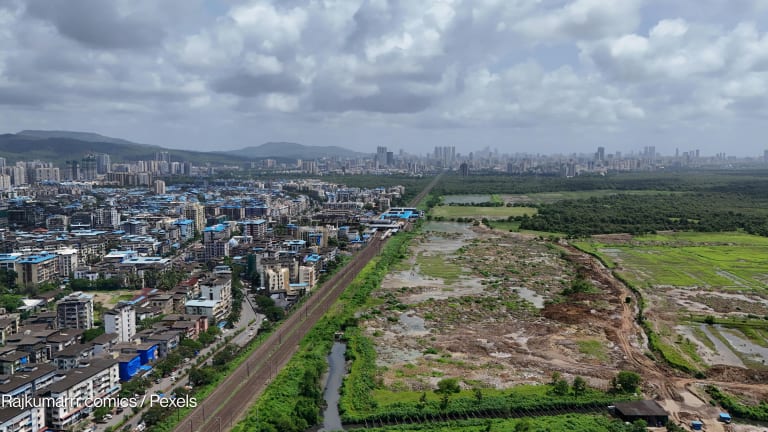
Leaders from the world’s most climate-vulnerable nations blamed rich countries Thursday for failing to deliver long-overdue climate funding — and called for a rethink of the financial flows needed to cover the gaps.
Speaking through mostly prerecorded messages at the V20 Climate Vulnerables Finance Summit, several heads of state said higher-income countries need to urgently meet their promise of mobilizing $100 billion in climate finance per year to help lower-income countries deal with the effects of climate change. They also called for additional money for climate adaptation, more private sector investment, and more grants as opposed to loans.
The V20 — or Vulnerable Twenty Group — represents economies from the larger Climate Vulnerable Forum, whose 48 members are the most exposed to the impacts of the climate crisis. CVF members have a collective population of 1.2 billion people but represent only 5% of global emissions. Thursday’s summit was the first of its kind and came just a day before the start of this year’s third meeting of finance ministers from the G-20 group of nations.
“Developing countries need reassurance that their ambition will be met with much-needed and still-lacking financial and technical support,” said António Guterres, secretary-general at the United Nations. “To rebuild trust, developed countries must clarify now how they will effectively deliver $100 billion in climate finance annually to the developing world, as was promised over a decade ago.”
Sheikh Hasina, the prime minister of Bangladesh, whose country currently presides over CVF, said the international community “should recognize the vulnerability of our people” and spoke about the “historical responsibilities and … moral and legal obligations” of higher-income countries to help out.
Costa Rican President Carlos Alvarado Quesada said that $100 billion per year is not “a fair response to the urgency that the climate crisis is demanding from us,” adding that support must move from billions to trillions of dollars starting in 2025.
He called for more grant-based finance, saying that around 80% of current climate finance comes in the form of loans, which “worsens our financial burdens and increases the climate vulnerability of developing countries.” Alvarado Quesada also said money should be made available more quickly once a climate-related project is on the table.
“Climate-vulnerable and financially stressed nations do not have the luxury of waiting one, two, or more years to access the limited funds that are available. Simpler and faster processes are urgent,” he said.
Leaders from countries such as Ethiopia, the Marshall Islands, Bangladesh, and Colombia were quick to emphasize their efforts on the ground to help their communities decarbonize and mitigate the effects of climate change.
But some dissatisfaction was also in the air.
Alvarado Quesada said climate-responsible countries like his own have invested billions over the last decade “to contribute to the planet’s health.”
“Our efforts remained undervalued and not sufficiently acknowledged,” he said. “What we have given back to the world has not been rewarded accordingly.”
Several members of CVF are small island developing states whose economies are highly dependent on tourism and other climate-sensitive sectors. Increases in extreme weather events, prolonged droughts, and bigger floods make it more challenging for vulnerable nations to adapt, which means external financing can be a matter of survival in some cases. The economic hit from the COVID-19 pandemic is escalating the challenge further.
According to Germanwatch’s 2021 global climate risk index, the 10 countries most affected by climate change between 2000 and 2019 were Puerto Rico, Myanmar, Haiti, the Philippines, Mozambique, the Bahamas, Bangladesh, Pakistan, Thailand, and Nepal. Four are members of the V20.
Guterres said a higher percentage of climate financing should flow toward adaptation needs, which currently get about $16.7 billion per year. But adaptation costs in lower-income countries are $70 billion annually and could rise to $300 billion per year, he said.
Sahle-Work Zewde, the president of Ethiopia, said insufficient climate funding hinders the world’s efforts to achieve the Sustainable Development Goals. She also advocated for “adequate and predictable funding” to mitigate the costs of climate change.
Leaders called on all multilateral development banks to align their financing with the Paris climate agreement.
Guterres said these institutions will play a very important role in the short term, since they can either help lower-income countries transition to greener forms of energy or trap them in high-carbon economies with potentially stranded assets. Alvarado Quesada added that climate-vulnerable countries should also commit to fully eliminating fossil fuel subsidies, since they will make it harder to access finance in the future and jeopardize global efforts to deal with the climate crisis.
“Climate-vulnerable and financially stressed nations do not have the luxury of waiting one, two, or more years to access the limited funds that are available.”
— Carlos Alvarado Quesada, president of Costa RicaJohn Kerry, the U.S. special climate envoy, said in a live speech to the summit that the 26th U.N. Climate Change Conference of the Parties in Scotland later this year “has to be a moment of confrontation with the truth,” when all countries need to showcase clear policies for how the world can collectively stop temperatures from rising above 1.5 degrees Celsius. He also reiterated the United States’ pledge to restart payments to the Green Climate Fund.
Both he and Alok Sharma, the United Kingdom’s COP 26 president, said that the $100 billion promise per year needs to materialize.
“We must deliver the $100 billion that we have promised to developing countries. That is a matter of trust,” Sharma said.
Members of the G-7 group of major industrial nations agreed last month to raise their contributions to meet their $100 billion spending pledge. But critics have said seeing the implementation will be important since only two countries, Canada and Japan, made firm promises of more cash.








